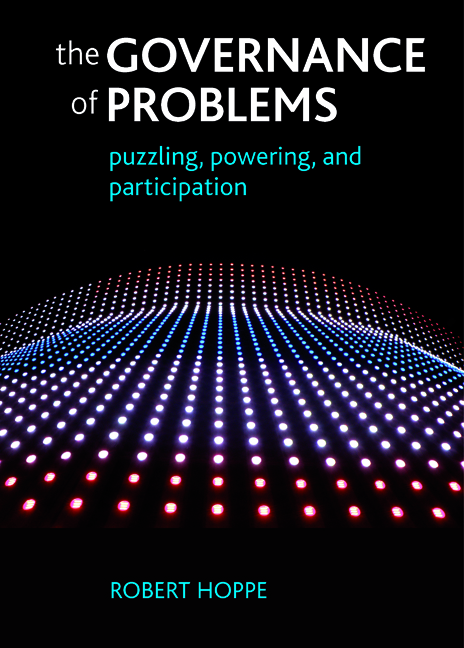Book contents
- Frontmatter
- Dedication
- Contents
- List of boxes, figures and tables
- About the author
- Preface
- one A problem-processing perspective on governance
- two The governance of problems: a map
- three Analysing policy problems: a problem-structuring approach
- four Cultures of public policy problems
- five Problem types and types of policy politics
- six Problem-structuring dynamics and meta-governance
- seven Making policy analysis doable and reflexive
- eight The plural democracies of problems: a meta-theory
- nine Public engagement and deliberative designs
- ten Responsible and hopeful governance of problems
- Bibliography
- Index
ten - Responsible and hopeful governance of problems
Published online by Cambridge University Press: 01 September 2022
- Frontmatter
- Dedication
- Contents
- List of boxes, figures and tables
- About the author
- Preface
- one A problem-processing perspective on governance
- two The governance of problems: a map
- three Analysing policy problems: a problem-structuring approach
- four Cultures of public policy problems
- five Problem types and types of policy politics
- six Problem-structuring dynamics and meta-governance
- seven Making policy analysis doable and reflexive
- eight The plural democracies of problems: a meta-theory
- nine Public engagement and deliberative designs
- ten Responsible and hopeful governance of problems
- Bibliography
- Index
Summary
We need to accept the impossibility of reasoning all the way to solutions, thus leaving generous room for power and arbitrariness. (Lindblom, 1999: 63)
Since … in the density of social reality each decision brings unexpected consequences, and since, moreover, man responds to these surprises by inventions which transform the problem, there is no situation without hope…. (Maurice Merleau-Ponty, quoted in Dauenhauer, 1986: 246)
Introduction
This final chapter is devoted to reflecting on the answers to the questions formulated in Chapter Two. It looks back on the intellectual journey in this book, and asks how far we have come. Thus, the first section is a succinct list of answers to the questions raised about the governance of problems – about the meaning of the ‘governance of problems’ perspective itself, about the translation dynamics in socio-political contexts, about the framing and design dynamics or policy-analytic aspects, and about participation and democracy from an institutional or polity-oriented perspective. The second section picks up an implied question that has deliberately been sidestepped so far, that is, the dilemmatic relationship between puzzling and powering. It was argued that meta-governance as deliberate interpolable balancing is the only possibility of creating more space for deliberative-democratic policy making. However, one should be aware of the inevitable tension between powering and puzzling in policy problem structuring. Even though better deliberative-cum-participatory designs and more institutional spaces may lead to more successful avoidance of wrong-problem problems, the methods, rules and procedures of problem-sensitive and frame-reflective policy analysis may well be instrumentalised as one way of power politics, or fighting over policy. The last section grapples with the issue of how to respond to this inevitable tendency.
Propositions on the governance of problems
What does the ‘governance of problems’ mean?
The fundamental idea of the book was that it makes sense to see democratic politics as a question-and-answer game, and policy making as the governance of problems. The possibility of viewing politics as a question-and-answer game, and policy making as an interrogatory debate on collective problems, is rooted in an image of man as freedom-in-responsibility, as ‘homo respondens’. The focus on problem processing derives from another image-of-man assumption, namely that man is unity-in-disharmony .
- Type
- Chapter
- Information
- The Governance of ProblemsPuzzling, Powering and Participation, pp. 243 - 262Publisher: Bristol University PressPrint publication year: 2010

